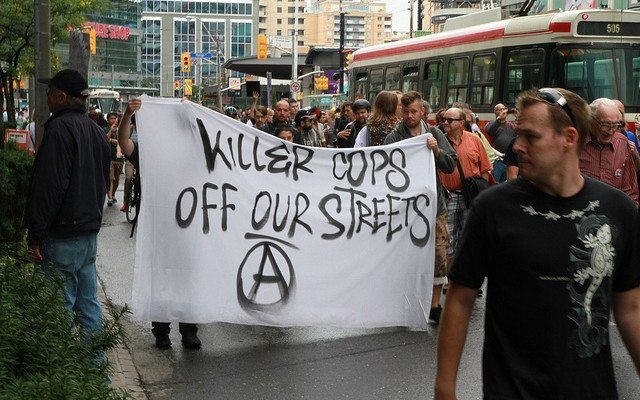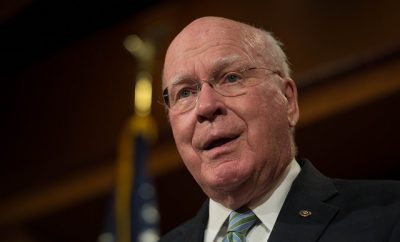
Crime
Albuquerque Police Department Brought Under Federal Oversight
The Department of Justice (DOJ) has reached an agreement with the mayor of Albuquerque for an independent monitor to oversee the city’s troubled police department. The Albuquerque Police Department (APD) has been under investigation by the DOJ since November 2012 due to mounting concerns that their habitual use of excessive force violates citizens’ constitutional rights.
The investigation was launched following a series of high profile police shootings under questionable circumstances. Iraq war veteran Kenneth Ellis III was shot while holding a gun to his own head, and Alan Gomez was shot at his home while “armed” with a plastic spoon. A graphic video released by the APD showed homeless camper James Boyd being shot four times after he appeared to be surrendering to officers.
Changing the “shoot-first-ask-later” mentality of the department will not be easy, to say the least. According to the Associated Press, the APD has shot 41 people over the past four years, 27 of them fatally. With a population greater than 550,000 people, the city of Albuquerque is ahead of both Chicago and New York in terms of police-related deaths per capita.
The high number of incidents involving alleged police misconduct has eroded community trust in both city officials and the police, spurring a series of protests that have even included an attempted “citizen’s arrest” of Police Chief Gorden Eden. “It has reached a boiling point,” one protester told the Associated Press, “people just can’t take it anymore.”
The agreement comes just three months after the DOJ released a report stating that:
APD officers too frequently use deadly force against people who pose a minimal threat and in situations where the conduct of the officers heightens the danger and contributes to the need to use force.
The report also found systematic deficiencies in the department that contribute to its troubling pattern of excessive force. Failed accountability systems, deficient policies, and a lack of sufficient civilian oversight were all listed as contributing causes.
According to a joint statement, the DOJ and the city will focus on reforming eight areas of concern: use of force policies, interactions with individuals with mental illness and other disabilities, tactical units, training, internal investigations and civilian complaints, management and supervision, recruitment and selection of officers, and community engagement and oversight.
This process will be overseen by an independent monitor appointed by the federal government, and will rely heavily on cooperation from the APD as well as input from community leaders. The agreement, formally known as a consent decree, is legally binding and puts the city of Albuquerque under the oversight of a federal court until the APD is in full compliance with the mandated reforms.
About 20 cities have entered into similar agreements with the DOJ since the Violent Crime Control and Law Enforcement Act was passed in 1994. Simply put, the act allows the DOJ to effectively sue police agencies that exhibit a “pattern and practice” of using excessive force and violating constitutional rights. The DOJ can then force those departments to implement a series of reforms that are meant to prevent any future abuses.
The success of the agreements depends largely on how resistant the police department in question is to change. There is no set time limit for a consent decree–the Oakland Police Department has been under one for nearly a decade–but some departments push back against the court-mandated reforms, which can prolong the process.
David Correia, a professor at the University of New Mexico and local organizer, doubts that the APD will be able to successfully implement reforms. “If history is any guide then [this process] won’t work,” Correia told Truthout. In 1997, a different report found some of the same exact systematic deficiencies that were listed in the DOJ’s report. As it turns out, reforms were implemented by some of the same people who are still in charge today, and they clearly did lead to the necessary changes in the department. “As a result, six years after those reforms, [the APD] killed more people at a higher rate” Correia explained. “So there can be no day-to-day control of the police department by [Police Chief] Eden, Huntsman, any of the deputy chiefs, or [Mayor Berry], but the DOJ won’t go that far”
Only time will tell if the consent decree will be embraced by police and city leadership in Albuquerque. The community remains weary and distrustful after years of abuse, but feels that the agreement is definitely a step in the right direction. Attorney General Eric Holder is also optimistic that the APD can correct troubling practices and restore public trust. Holder stated:
This agreement marks an important step forward in addressing the unreasonable use of deadly force uncovered in our investigation into the Albuquerque Police Department. The residents of Albuquerque depend on their police department to serve their community with honor and integrity.
Consent decrees and federal monitoring have been able to successfully reform a number of police departments, but departments generally get out what they put in. The APD is being presented with a chance to turn over a new leaf, but whether they will grasp this opportunity or cling to their old ways has yet to be seen. Either way, change is coming to the department, and all that the residents of Albuquerque can hope for is that these changes extend past the moment that federal oversight ends.
—
Nicole Roberts (@NicoleR5901) a student at American University majoring in Justice, Law, and Society with a minor in Mandarin Chinese. She has a strong interest in law and policymaking, and is active in homeless rights advocacy as well as several other social justice movements. Contact Nicole at staff@LawStreetMedia.com.
Featured image courtesy of [Joseph Morris via Flickr]








Comments